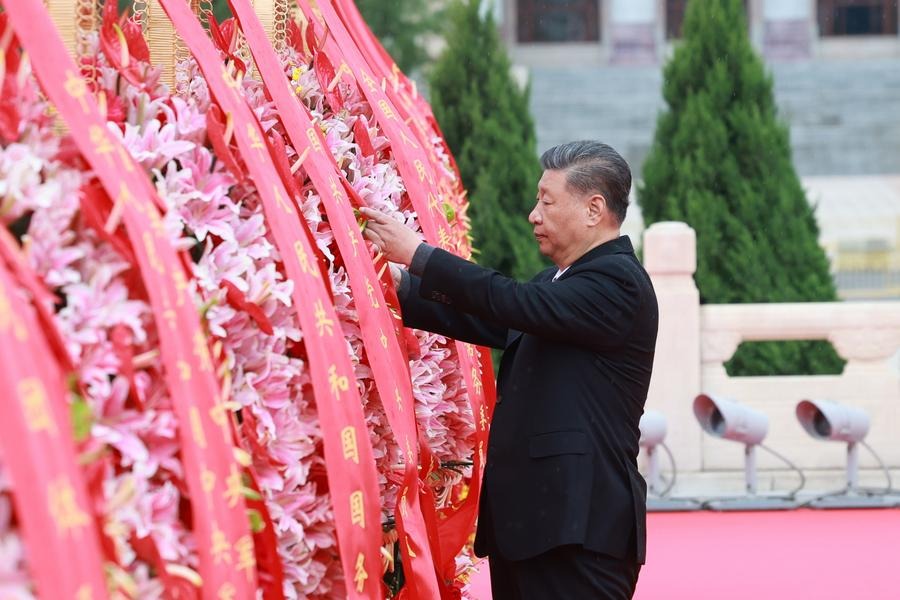Despite turbulence, foreign firms keen on investment
Shanghai in particular major draw for setting up regional headquarters


Despite all the headwinds in global markets, foreign firms' interest in further tapping into the Chinese market seems unchanged, with US life sciences company Danaher Corp being among them.
In mid-March, Leica Microsystems, which became part of Danaher in 2005, signed agreements with Shanghai Jinqiao Group to invest 200 million yuan ($27 million) to expand a manufacturing and R&D base in Shanghai's Pudong New Area. About 60 percent of Leica Microsystems' business will realize localization once the expansion is completed next year.
In addition, Cytiva, a biotechnology company under Danaher, saw its Pudong-based China innovation center inaugurate a new cell culture development base in March with an investment of around 20 million yuan.
Peng Yang, president of Danaher China, said the reason for the company's recent expansion is simple: "We have never seen the ceiling of reform in Pudong."
Danaher is not the only company showing unchanged confidence in the growth outlook in Pudong, and on a broader perspective, in China.
During a promotion conference held on April 18, which also celebrated the 35th anniversary of Pudong's reform and opening-up, four multinational companies signed agreements with the local administration to land new projects in Pudong.
These include the 600 million yuan headquarters project by Japanese industrial equipment maker Morimatsu Group, 1 billion yuan production base of Japanese biotech firm Daiichi Sankyo, 2.4 billion yuan industrial base of multinational agribusiness conglomerate Yihai Kerry and an information technology company set up by international commodities trader Trafigura Ltd, with an investment of about 50 million yuan.
Likewise, German chemical giant BASF announced on April 14 it would invest 500 million yuan to expand its Shanghai Cellasto plant based in Pudong, which provides noise, vibration and harshness reduction solutions for the auto sector. The plant's annual output will rise significantly by 70 percent once it goes operational in 2027.
Apart from serving the electronics and consumer goods companies, the company aims to better capitalize on China's electric vehicle sector with its continued investments, said Xu Yibin, BASF vice-president and general manager of the Pudong site.
"Our confidence in Pudong derives from the rich talent supply, increasingly expanding industrial ecosystem, the local government's continued efforts and the market-based, legal and international business environment, which can be considered first-rate on a global perspective," said Xu.
But of course, the vibrant entrepreneurship in China, the rapidly evolving NEV sector and, more importantly, the country's massive market size should never be overlooked, Xu added.
The constantly improving business environment in Pudong serves as a major magnet for multinational companies.
Chen Jiayuan, CEO of global agribusiness giant Louis Dreyfus North Asia, said the various investment facilitation policies and financial opening-up measures adopted in the China (Shanghai) Pilot Free Trade Zone have provided much support for commercial expansion.
"Shanghai's government work report released at the beginning of the year touched upon experimental policies concerning offshore renminbi trading, cross-border trade settlement and the cross-border hedging for commodities. These will substantially benefit companies to better serve clients while managing risk," he said.
In early April, Shanghai released its three-year action plan (2025-27) for commodities trading. The measures — such as expanding trading categories and deepening coordination of the spot and futures markets — can effectively manage risks and thus improve companies' profitability, Chen said.
On April 15, Pudong released a set of 14 new measures to better attract foreign investment. Aiming to introduce more advanced foreign manufacturing firms and modern services providers, Pudong will guarantee national treatment of foreign-invested enterprises, explore a management mechanism for easy and safe cross-border data flow and ensure foreign-invested companies' participation in government procurement projects, among others items.
According to the action plan released on April 21 to improve the facilitation of cross-border financial services provided in Shanghai, banks are encouraged to develop deposit products for overseas institutions' free trade accounts. Interest rates for nonresident deposits under the free trade account system can refer to international practices and use market-based pricing standards.
These will not only attract more foreign capital inflow, but also help to retain such capital onshore for longer periods, explained banks with branches in the Shanghai FTZ.
























